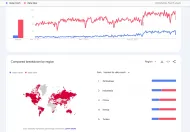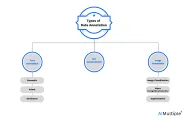In-Depth Guide to Data Commercialization in 2024
Companies in every industry use data to create value and manage data as an asset. They collect and analyze huge amounts of data coming from various sources. The increasing availability of data enables businesses to make real-time decisions. Businesses have realized that not sharing their data is a fundamental organizational barrier, and 47% of organizations are already commercializing their data to generate revenue.
What is data commercialization?
Data commercialization can be defined as taking existing data obtained from business operations and turning it into a new revenue stream.
How is it different from data monetization?
Data monetization is the process of using existing data to generate revenue. Companies can sell data to third parties in raw form or in a form converted into insights. However, commercialization is the process of leveraging data for business. It focuses on bringing new products or services to market and enables companies to achieve better business results.
What are the major data commercialization components / techniques?
Internet of things (IoT), artificial intelligence (AI), and blockchain are the three major technological components contributing to the growth of data commercialization.
- IoT: IoT enables companies to collect huge amounts of data from edge devices. By 2025, the global market for IoT end-user solutions is expected to reach $1.6 trillion. Companies are realizing the opportunities presented by IoT technology and they can make real-time decisions with IoT-based data.
- AI: Companies implement AI and ML techniques to their data commercialization strategy. These techniques enable companies to process their data and develop innovative products. For example, Amazon’s commercial IoT product Echo collects data from consumers’ commands and recommends other related products to them by processing the data.
- Blockchain: Security issues are an important aspect of data commercialization strategy. Blockchain enables organizations to have an “open and distributed ledger” that records data and allows for secure transmission. Verification is required to change the record.
What are some of data commercialization issues?
- Data quality: Organizations can only create value with clean and usable data. Otherwise, data commercialization can be a massive flop for businesses.
- Data relevance: Depending on the context, the way data is collected and governed changes. You may want to use the same data in a different use case or business unit. In this case, you have to think about whether the data is still useful in a new context. The value of data depends on its availability, structure, and cleanliness.
- Technical barriers: When integrating data from different systems, companies can encounter technical challenges due to data sourcing. They must consider these challenges such as format of the data or whether it is encrypted or unencrypted.
What are the best practices of data commercialization?
Not all companies are successful in commercializing their data. Here are some practices to overcome the challenges of data commercialization:
- Data map: You should understand how data needs to be managed and collected. For example, you should create a data map taking into account what data you have, what data is sensitive, and so on. This has an impact on data quality and data security.
- Understand pricing strategies: You should identify commercially viable offerings. Selling price of data should be comparable to those of other companies. There are some important approaches to data pricing:
- Quantitative pricing: It allows setting a base price for the data set. The marginal costs of data generation such as the costs of data storage and data collection affect the selling price of the data.
- Qualitative pricing: This is the value of a data set as perceived by customers. Other factors such as return on investment and competitors’ prices, etc. affect the selling prices of data. The final price is determined by the market.
If you have questions, we would like to help:



Comments
Your email address will not be published. All fields are required.